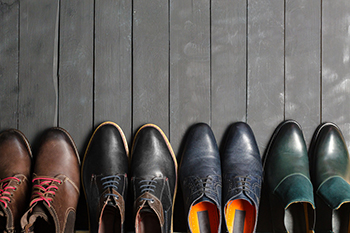
First and foremost, wearing ill-fitting shoes can lead to a myriad of injuries. Whether they are too tight, too loose, or simply not designed for the activity you are engaging in, improper footwear can place undue stress on your feet, ankles, lower legs, and joints, increasing your risk of pain and injury. From common issues like shin splints and ingrown nails to more severe problems such as bunions and postural misalignments, the repercussions of wearing the wrong shoes can be far-reaching and debilitating, potentially limiting your ability to engage in physical activity altogether. Furthermore, wearing the wrong shoes can worsen existing conditions, such as arthritis, making daily activities more challenging and uncomfortable. Plus, when your shoes fail to support your natural gait or foot structure, it can lead to overpronation, underpronation, or other biomechanical issues, placing added strain on your joints and increasing your risk of injury. If your feet are painful after performing certain activities or from wearing certain shoes, it is suggested that you schedule an appointment with a podiatrist to determine whether your footwear may need to be changed.
It is important to find shoes that fit you properly in order to avoid a variety of different foot problems. For more information about treatment, contact Alice Kim, DPM from 101 Foot and Ankle. Our doctor will treat your foot and ankle needs.
Proper Shoe Fitting
Shoes have many different functions. They cushion our body weight, protect our feet, and allow us to safely play sports. You should always make sure that the shoes you wear fit you properly in order to avoid injuries and deformities such as: bunions, corns, calluses, hammertoes, plantar fasciitis, stress fractures, and more. It is important to note that although a certain pair of shoes might be a great fit for someone else, that doesn’t mean they will be a great fit for you. This is why you should always try on shoes before buying them to make sure they are worth the investment. Typically, shoes need to be replaced ever six months to one year of regular use.
Tips for Proper Shoe Fitting
- Select a shoe that is shaped like your foot
- Don’t buy shoes that fit too tight, expecting them to stretch to fit
- Make sure there is enough space (3/8” to ½”) for your longest toe at the end of each shoe when you are standing up
- Walk in the shoes to make sure they fit and feel right
- Don’t select shoes by the size marked inside the shoe, but by how the shoe fits your foot
The shoes you buy should always feel as good as they look. Shoes that fit properly will last longer, feel better, and improve your way of life each day.
If you have any questions, please feel free to contact our office located in Camarillo, CA . We offer the newest diagnostic and treatment technologies for all your foot care needs.
